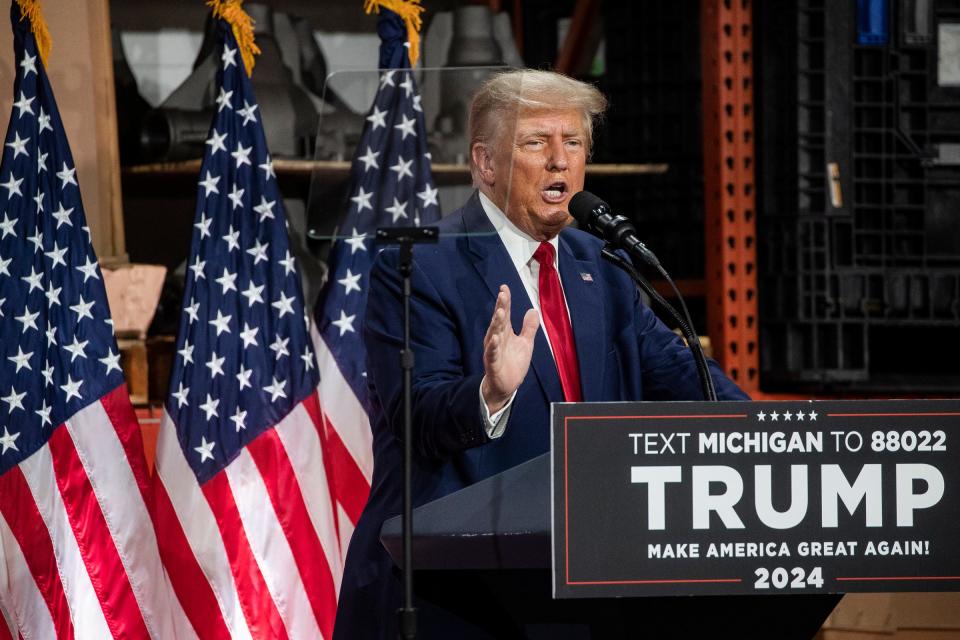Michigan Supreme Court keeps Trump on ballot; rejects insurrectionist argument
- Oops!Something went wrong.Please try again later.
- Oops!Something went wrong.Please try again later.
LANSING — The Michigan Supreme Court has declined to hear a case arguing that former President Donald Trump should be excluded from the state's primary ballot, meaning the front-runner for the GOP nomination will remain a listed candidate.
The order issued Wednesday is in line with lower court rulings in Michigan, though at odds with a recent ruling by the Colorado Supreme Court.
The argument over whether Trump is an eligible candidate for president centers on whether his conduct related to the Jan. 6, 2021, riot at the U.S. Capitol should be considered engaging in insurrection. The 14th Amendment to the U.S. Constitution bars anyone who has taken an oath to uphold the Constitution to hold office if they have "engaged in insurrection or rebellion" against the U.S. Another central issue in a spate of court cases is whether it would be within state powers, or only the power of Congress, to bar a candidate over such an issue.

In a Wednesday order, Michigan's highest state court said it is "not persuaded that the present questions should be reviewed by this court."
It refused to reconsider a mid-December decision by a three-judge state Court of Appeals panel. That ruling affirmed a lower court ruling that neither the courts nor Secretary of State Jocelyn Benson can bar former Trump from being a candidate in Michigan's Feb. 27 Republican primary.
Mark Brewer, the lawyer for Michigan voters seeking to exclude Trump from the ballot and a former chairman of the Michigan Democratic Party, called the decision "very disappointing but extremely narrow." If Trump becomes the Republican nominee, his clients will again challenge his eligibility for the general election ballot in November, he said.
Justice Elizabeth Welch, a Democratic nominee, dissented, citing the Colorado decision, among other issues.
Welch said she agrees with the Michigan Court of Appeals that under the wording of state law, the secretary of state does not have the authority to exclude from the ballot a prominent candidate such as Trump, whose name has been put forward by a political party, regardless of whether he is ineligible under the U.S. Constitution.
However, "political parties might have an obligation to ensure that proposed presidential primary candidates are eligible," she wrote.
The difference between Michigan and Colorado law
"Considering the importance of the legal questions at issue and the speed with which the appellants and the judiciary have moved, I believe it is important for this court to issue a decision on the merits."
Michigan's lower courts, along with courts in some other states, have found that the question of whether Trump is disqualified under Section 3 is one for Congress — at least in terms of a primary election — and not the state's courts or election officials to decide.
But the Colorado Supreme Court's split decision, which is on hold pending the question of whether the U.S. Supreme Court will settle the matter, states that there is nothing in the 14th Amendment, which was written in response to the Civil War, that requires Congress, rather than a state, to make that determination, only that the U.S. House and Senate can lift any disqualification if they so choose.
And the Colorado opinion noted that its state law outlines a duty to "exclude constitutionally disqualified candidates," in a process run through its courts, ahead of any election, including a primary.
Michigan law includes no similar provision.
Michigan Secretary of State Jocelyn Benson said she is gratified by the ruling and it is up to the U.S. Supreme Court to provide further clarity.
"We clearly stated months ago that, when it comes to ballot access for candidates in a presidential primary, my authority is limited to ensuring that any individuals 'generally advocated by the national news media to be potential presidential candidates,' along with any recommended by state political parties, qualify to be on the ballot," Benson said in a news release. "We followed that law."
Contact Paul Egan: 517-372-8660 or pegan@freepress.com. Follow him on X, formerly known as Twitter, @paulegan4.
This article originally appeared on Detroit Free Press: Michigan Supreme Court says Trump will stay on state primary ballot

